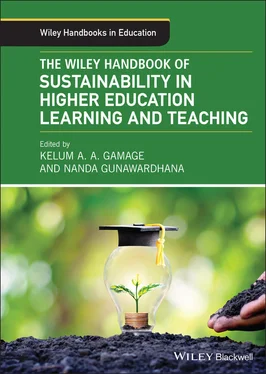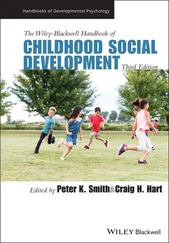Also, at times, it is possible that we, as educators, want to see ourselves as the spark that inspires students to self‐change and flourish. However, we must be vigilant, as our ego may come to the fore. Instead, we might think of ourselves as part of a larger system working toward excellence.
Such a responsibility demands a great deal of humility. Becoming virtuous is a life project, an open‐ended process; we need to remind ourselves that our relevance comes not because we are realized virtuous persons, but because we recognize the value of becoming virtuous and we strive for virtues (Sanderse 2012). In this sense, our moral interactions with students are micro‐moments in our moral, political, and spiritual growth. The meaningfulness of these micro‐moments will depend on the stage of moral development of students and our own, and where both meet on the journey.
1 Ames, M.C.F.D.C. and Serafim, M.C. (2019). Teaching‐learning practical wisdom (Phronesis) in administration: a systematic review. Revista de Administração Contemporânea. 23: 564–586.
2 Aristotle (2014). Nicomachean Ethics (Translated by C.D.C. Reeve. Indianapolis: Hackett Publishing Company.
3 Athanassoulis, N. (2018). Acquiring Aristotelian virtue. In: The Oxford Handbook of Virtue (ed. N.E. Snow), 415–431. Oxford: Oxford University.
4 Augenstein, K. and Palzkill, A. (2016). The dilemma of incumbents in sustainability transitions: a narrative approach. Administrative Sciences. 6 (1): 1–23.
5 Barnett, R. (2004). Learning for an unknown future. Higher Education Research and Development 23 (3): 247–260.
6 Barth, M. and Rieckmann, M. (2016). State of the art in research on higher education for sustainable development. In: Routledge Handbook of Higher Education for Sustainable Development (ed. M. Barth, G. Michelsen, M. Rieckmann and I. Thomas), 100–113. London: Routledge.
7 Black, D.S., Milam, J., and Sussman, S. (2009). Sitting‐meditation interventions among youth: a review of treatment efficacy. Pediatrics. 124 (3): e532–e541.
8 Blok, V., Gremmen, B., and Wesselink, R. (2016). Dealing with the wicked problem of sustainability: the role of individual virtuous competence. Business and Professional Ethics Journal. 34 (3): 297–327.
9 Boellinghaus, I., Jones, F.W., and Hutton, J. (2013). Cultivating self‐care and compassion in psychological therapists in training: the experience of practicing loving‐kindness meditation. Training and Education in Professional Psychology. 7: 267–277.
10 Bond, K., Ospina, M.B., Hooton, N. et al. (2009). Defining a complex intervention: the development of demarcation criteria for “meditation”. Psychology of Religion and Spirituality. 1: 129–137.
11 Cafaro, P. (2015). Environmental virtue ethics. In: The Routledge Companion to Virtue Ethics (ed. L. Besser‐Jones and M. Slote), 451–468. New York: Routledge.
12 Cain, A. (2005). Books and becoming good: demonstrating Aristotle's theory of moral development in the act of reading. Journal of Moral Education. 34 (2): 171–183.
13 Carr, D. (2005). On the contribution of literature and the arts to the educational cultivation of moral virtue, feeling and emotion. Journal of Moral Education. 34 (2): 137–151.
14 Carr, D. (2006a). Moral education at the movies: on the cinematic treatment of morally significant story and narrative. Journal of Moral Education. 35 (3): 319–333.
15 Carr, D. (2006b). The significance of music for the moral and spiritual cultivation of virtue. Philosophy of Music Education Review. 14 (2): 103–117.
16 Carr, D., Arthur, J., and Kristjánsson, K. (2017). Varieties of Virtue Ethics. London: Springer.
17 Corbett, J. and Lydon, M. (2018). 5. Community‐based mapping: a tool for transformation. In: Learning and Teaching Community‐Based Research (ed. C. Elmanski and B.L. Hall), 113–134. Toronto: University of Toronto Press.
18 Crossan, M., Mazutis, D., and Seijts, G. (2013). In search of virtue: the role of virtues, values and character strengths in ethical decision making. Journal of Business Ethics 113 (4): 567–581.
19 Curzer, H.J. (2012). Aristotle and the Virtues. Oxford: Oxford University Press.
20 Davies, B. (2006). Subjectification: The relevance of Butler’s analysis for education. British Journal of Sociology of Education 27 (4): 425–438.
21 Delors, J. (1998). Learning: The Treasure Within. UNESCO.
22 Diessner, R., Rust, T., Solom, R.C. et al. (2006). Beauty and hope: a moral beauty intervention. Journal of Moral Education. 35 (3): 301–317.
23 Dobson, A. (2003). Citizenship and the Environment. Oxford: Oxford University Press.
24 Ehrenfeld, J.R. and Hoffman, A.J. (2013). Flourishing: A Frank Conversation about Sustainability. Sheffield: Stanford University Press.
25 Feola, G. (2020). Capitalism in sustainability transitions research: time for a critical turn? Environmental Innovation and Societal Transitions. 35: 241–250.
26 Foster, J. (2001). Education as sustainability. Environmental Education Research. 7 (2): 153–165.
27 Foucault, M. (2008). Birth of Biopolitics: Lectures at the College de France 1978–79. New York: Palgrave Macmillan.
28 Freire, P. (1974). Education for Critical Consciousness. New York: Continuum.
29 Geels, F.W. (2004). From sectoral systems of innovation to socio‐technical systems: insights about dynamics and change from sociology and institutional theory. Research Policy. 33 (6–7): 897–920.
30 Göpel, M. (2016). The Great Mindshift: How a New Economic Paradigm and Sustainability Transformations Go Hand in Hand. Switzerland: Springer Nature.
31 Gough, S. and Scott, W. (2003). Sustainable Development and Learning: Framing the Issues. New York: Routledge.
32 Gruenewald, D.A. (2003). The best of both worlds: a critical pedagogy of place. Educational Researcher. 32 (4): 3–12.
33 Hannis, M. (2015). The virtues of acknowledged ecological dependence: sustainability, autonomy and human flourishing. Environmental Values. 24 (2): 145–164.
34 Hartman, E.M. (2006). Can we teach character? An Aristotelian answer. Academy of Management Learning and Education. 5 (1): 68–81.
35 Harvey, D. (2005). A Brief History of Neoliberalism. Oxford: Oxford University Press.
36 Hattam, R. and Baker, B. (2015). Technologies of self and the cultivation of virtues. Journal of Philosophy of Education 49 (2): 255–273.
37 Hopwood, B., Mellor, M., and O'Brien, G. (2005). Sustainable development: mapping different approaches. Sustainable Development. 13 (1): 38–52.
38 Hursthouse, R. (1999). On Virtue Ethics. New York: Oxford University Press.
39 Jacobs, J. (2017). Aristotelian ethical virtue: naturalism without measure. In: Varieties of Virtue Ethics (ed. D. Carr, J. Arthur and K. Kristjánsson), 125–142. London: Springer.
40 Jarvis, M. (2005). Towards a philosophy of human learning: an existentialist perspective. In: Human Learning. A Holistic Approach (ed. P. Jarvis and S. Parker). New York: Routledge.
41 Jarvis, W.P. and Logue, D.M. (2016). Cultivating moral‐relational judgement in business education: the merits and practicalities of Aristotle's phronesis. Journal of Business Ethics Education 13: 349–372.
42 Jickling, B. and Wals, A.E. (2008). Globalization and environmental education: Looking beyond sustainable development. Journal of Curriculum Studies 40 (1): 1–21.
43 Jordan, K. and Kristjánsson, K. (2017). Sustainability, virtue ethics, and the virtue of harmony with nature. Environmental Education Research. 23 (9): 1205–1229.
44 Kallis, G. and Norgaard, R.B. (2010). Coevolutionary ecological economics. Ecological Economics. 69 (4): 690–699.
45 Kemp, R., Loorbach, D., and Rotmans, J. (2007). Transition management as a model for managing processes of co‐evolution towards sustainable development. The International Journal of Sustainable Development and World Ecology. 14 (1): 78–91.
Читать дальше












